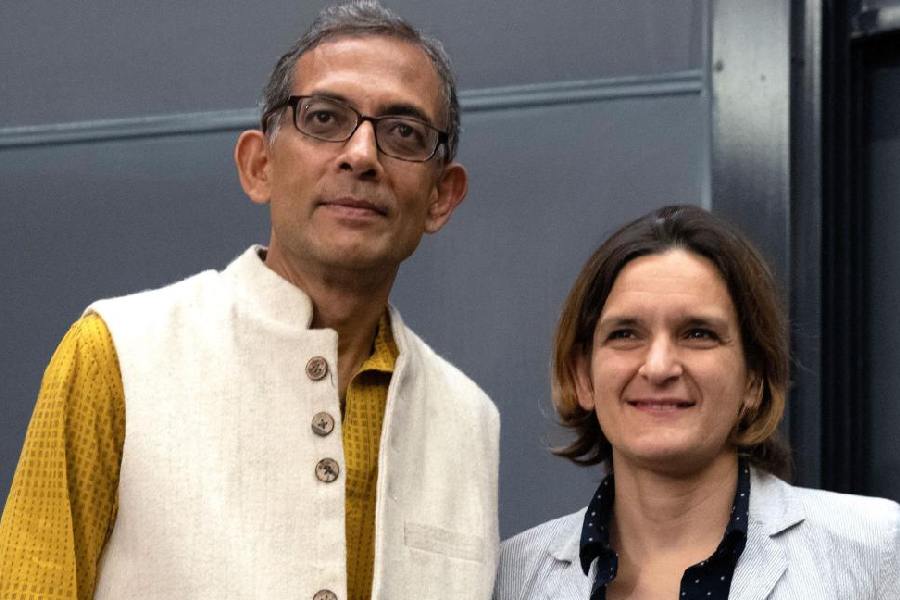A study in India has revealed that most children who excel at real-world maths selling vegetables or other goods in markets struggle with equivalent school arithmetic, while non-working schoolchildren perform poorly on “market maths” problems.
The research led by Nobel laureate economists Abhijit Banerjee and Esther Duflo has challenged the assumption in learning psychology that arithmetic skills can transfer naturally between practical and academic settings, highlighting the need for curriculum reforms.
Their findings point to “a broader failure” of teaching methods in India “to make usable connections between intuitive and formal understanding of maths ideas”, the researchers have said in their study published in the journal Nature on Wednesday.
They come amid growing evidence that formal school education isn’t adequately equipping children in India with the concepts and skills they need both for their daily lives and as a foundation for learning the higher maths required for success in
higher classes.
A nationwide survey in 2023, for instance, found that only half of children enrolled in Classes XI and XII, aged between 16 years and 18 years, could divide a three-digit number by a single-digit number. The annual survey, conducted by a non-government organisation called Pratham, also found that only half of the children sampled from Classes XI and XII could correctly calculate how many water purifying tablets a large pot requires after they were given the number needed for a smaller pot.
Banerjee and Duflo at the Massachusetts Institute of Technology and their coauthors in India and the US assessed the arithmetic skills of 1,436 children selling goods in markets in Calcutta and Delhi, and 471 children enrolled in schools who had no market-selling experience.
The children who sold goods spent part of the day at school and part of the day at the marketplace, thus receiving exposure to arithmetic operations in both settings. The researchers approached children who appeared 16 years of age or younger, although the study did include a few 17-year-olds.
In one experiment designed to test whether children working in markets can perform complex arithmetic calculations, the researchers surveyed 201 children in Calcutta’s markets. Undercover enumerators purchased unusual quantities of goods — for example, they would ask for 800 grams of potatoes being sold at ₹20 per kg or 1.4 kg of onions sold at ₹15 per kg. They would then hand over the child selling the goods a ₹200 note, collecting the change.
Most of these children effectively used arithmetic calculations in their tasks. Overall, 95 per cent of the children were correct on their second try — if incorrect on the first try — on their first transaction, with 97 per cent correct on their second transaction and 98 per cent correct on their third transaction.
Most children mentally performed the calculations without paper aids, the researchers said. However, despite their arithmetic competencies, these children struggled with school maths presented in abstract form. Only 32 per cent of children could solve a division of a three-digit number by a single-digit number and only 54 per cent could solve two subtraction problems involving two-digit numbers.
Non-working children solved simple abstract arithmetic problems with high accuracy when they were given unlimited time and pen and paper but performed poorly on concrete problems involving several simple operations such as one routinely solved by working children.
The findings suggest that “working children do less well on abstract maths because they resort to poorly mastered algorithms taught in school”, the researchers said. Schoolchildren do poorly in applied problems because they do not know any strategies other than those taught in school and are unable to apply them outside the classroom.
“This is a fresh reminder on the need for revising curriculum to connect school maths with out-of-school maths knowledge,” said Arindam Bose, an associate professor at the Centre for Excellence in Teacher Education, Tata Institute of Social Sciences, Mumbai, who was not connected with the study.
Earlier studies by independent research groups in Chennai, Delhi, and Mumbai had also pointed to what Bose calls “conceptual and procedural differences between school maths and out-of-school maths, albeit with
some overlaps”.
“School maths is largely focussed on numeracy knowledge — reading and writing numbers and applying mathematical operators on them,” Bose said. “But many who drop out of studying maths continue to use maths knowledge through alternative situation-specific procedures all the time.”
Bose and other mathematics education specialists say the need for changing curriculum had been recognised within the country some two decades ago. “The process of change has been initiated but has been slower than we’d want,” Bose said.











